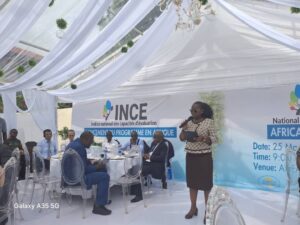
The African Evaluation Association (AfrEA) has launched a pioneering initiative in collaboration with the German Institute for Development Evaluation and the World Food Programme (WFP) to undertake the National Evaluation Capacities Index (INCE) in Africa.
This innovative project aims to enhance national evaluation capacities, promote data-driven decision-making, and champion sustainable development across the continent.
The pilot phase of the INCE in Africa will be conducted in six countries: Ghana, Benin, Congo, Morocco, South Africa, and Tanzania. Government officials and national consultants from each of these countries are currently undergoing training to better understand the INCE concept.
 The INCE is a groundbreaking tool designed to assess and strengthen national evaluation capacities, enabling countries to make informed decisions and drive sustainable development. By promoting data-driven decision-making, the INCE will help countries to better allocate resources, track progress, and evaluate the impact of their policies and programs.
The INCE is a groundbreaking tool designed to assess and strengthen national evaluation capacities, enabling countries to make informed decisions and drive sustainable development. By promoting data-driven decision-making, the INCE will help countries to better allocate resources, track progress, and evaluate the impact of their policies and programs.
According to Dr. Miché Ouédraogo, AfrEA President, the INCE will enable countries to track the success, weaknesses, and outcomes of their policies, ultimately leading to evidence-based decision-making.
Building the strongest policy for our country is to have evidence… And having evidence means that you have a strong national evaluation system.” – Dr. Ouédraogo.
The INCE is expected to have a significant impact on participating countries, including Ghana, by providing a framework for building and strengthening their national evaluation systems. The index will also facilitate cross-country comparisons and knowledge sharing, allowing countries to learn from each other’s experiences.
 Dr. Ouédraogo emphasized the importance of having a strong national evaluation system, saying, “We are all claiming for evidence-based policy. But having evidence policy means having strong system and having strong system means you know what is the strength and the weakness and have a clear plan to support and build this national evolution system.”
Dr. Ouédraogo emphasized the importance of having a strong national evaluation system, saying, “We are all claiming for evidence-based policy. But having evidence policy means having strong system and having strong system means you know what is the strength and the weakness and have a clear plan to support and build this national evolution system.”
The INCE is designed to be flexible, allowing countries to adapt it to their local context. However, the measurement will remain comparable across countries, enabling them to assess their progress and learn from each other.
AfrEA plans to present the first results of the INCE in June 2025, during its 25th-anniversary celebration. The organization hopes to expand the initiative to more countries in the second phase.
Building a culture of evaluation is essential for effective development, and we are committed to making evaluation a normal practice in our development process.” – Dr. Audrey Smock Amoah, Acting Director-General of the National Development Planning Commission (NDPC)
 According to Dr. Amoah, the INCE will enable Ghana to assess its national evaluation capacities, identify areas for improvement, and develop strategies to strengthen its evaluation system. This, she noted, is critical for effective development, as it will enable the government to make informed decisions, track progress, and evaluate the impact of its policies and programs.
According to Dr. Amoah, the INCE will enable Ghana to assess its national evaluation capacities, identify areas for improvement, and develop strategies to strengthen its evaluation system. This, she noted, is critical for effective development, as it will enable the government to make informed decisions, track progress, and evaluate the impact of its policies and programs.
The launch of the INCE is a significant milestone in Ghana’s efforts to strengthen its evaluation system, which has seen improvements in recent years, particularly in awareness and capacity to conduct monitoring and evaluation (M&E) at the ministry, department, and agency levels.
However, Dr. Amoah acknowledged that there are still weaknesses, particularly in building a culture of evaluation at the national and sub-national levels, which are largely due to capacity and resource constraints.
Despite these challenges, Dr. Amoah expressed her confidence that the INCE will enhance collaboration among countries, establish mechanisms to learn from each other’s experiences, and ultimately strengthen evaluation practices for development.
The INCE has already been successfully implemented in 11 Latin American countries and is now being rolled out in six African countries, with plans to expand to two more countries in Asia.
Juan Carlos Sanz with the German Institute fir Development Evaluation, expressed his excitement about the potential benefits of the program, stating, “I have the feeling that now that we are joining African countries, we are joining Asian countries, we have an even more powerful tool to learn, not only among countries but also among regions.”
AfrEA’s vision is to create a culture of evaluation in Africa, where data-driven decision-making becomes the norm. By strengthening national evaluation capacities, AfrEA aims to empower countries to take ownership of their development agendas and make informed decisions that drive sustainable development.

